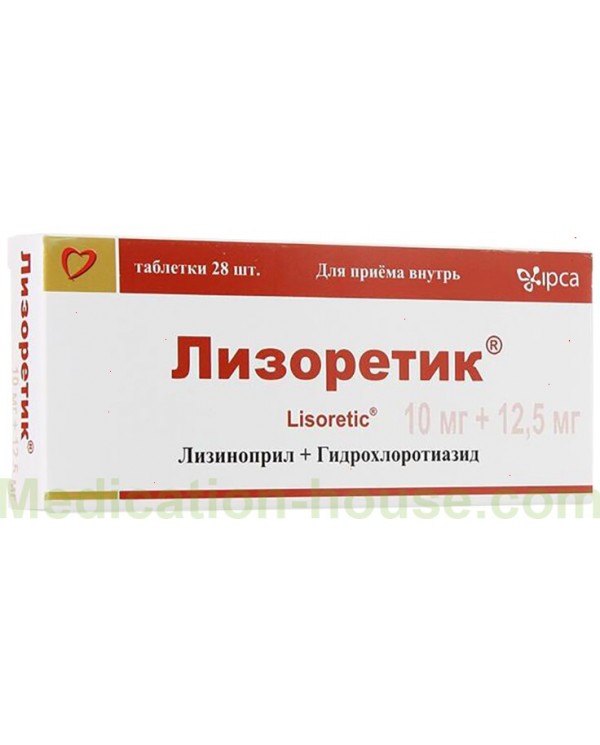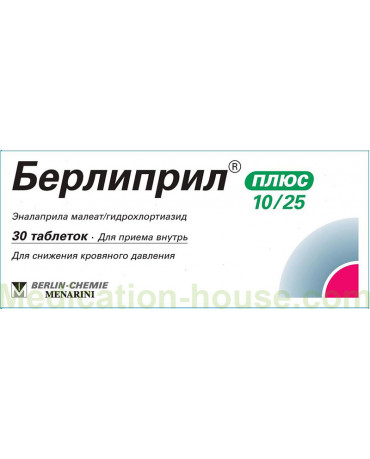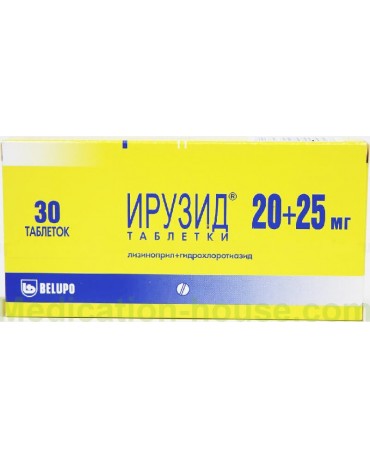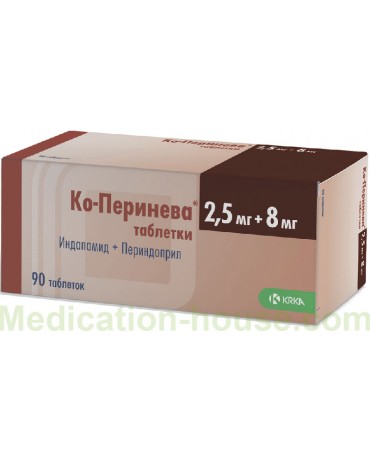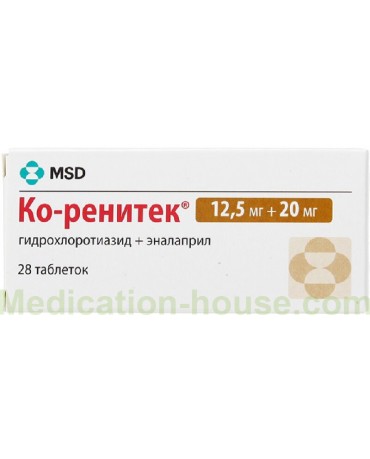Instruction for use of Lisoretic
Reed more and buy Lisoretic on this page
Lisoretic is a combined antihypertensive agent.
Release form and composition
Dosage form - tablets: round, biconvex; dosage 10 mg + 12.5 mg - light pink with darker blotches of color, with a dividing line; dosage 20 mg + 12.5 mg - almost white / white (in a cardboard box 2 blisters containing 14 tablets, and instructions for use of Lisoretic).
Composition of 1 tablet:
active substances: lisinopril (in the form of a dihydrate) - 10 or 20 mg, hydrochlorothiazide - 12.5 mg;
auxiliary components: mannitol, pregelatinized starch, corn starch, magnesium stearate, calcium hydrogen phosphate; 10 mg + 12.5 mg tablets also contain dyes of iron oxide red and iron oxide yellow.
Pharmacodynamics
Lisoretic is a combined preparation containing an ACE (angiotensin converting enzyme) inhibitor - lisinopril and a diuretic - hydrochlorothiazide as active ingredients. It has hypotensive and diuretic effects.
Lisinopril
As an ACE inhibitor, lisinopril reduces the formation of angiotensin II from angiotensin I, as a result of which the release of aldosterone decreases; reduces the degradation of bradykinin, increases the synthesis of prostaglandins. The substance provides a decrease in blood pressure (BP), reduces the total peripheral vascular resistance, pressure in the pulmonary capillaries and preload. In patients with heart failure, it increases minute blood volume and exercise tolerance. Under the influence of lisinopril, the arteries expand to a greater extent than the veins. Some of its effects are due to the effect on the tissue renin-angiotensin-aldosterone system (RAAS). With prolonged therapy, the hypertrophy of the myocardium and the walls of the resistive arteries decreases. The blood supply to the ischemic areas of the myocardium improves.
ACE inhibitors slow the progression of left ventricular dysfunction in patients without clinical manifestations of heart failure who have had myocardial infarction. Prolongs life expectancy in patients with chronic heart failure.
The effect of lisinopril develops within 1 hour, reaches a maximum within 6-7 hours, lasts up to 24 hours. In patients with arterial hypertension, the effect of the drug is observed in the first days of treatment, a stable effect develops after 1-2 months of regular use.
Hydrochlorothiazide
Thiazide diuretic, the diuretic effect of which is explained by the violation of the reabsorption of water and ions of chlorine, sodium, magnesium and potassium in the distal nephron. Inhibits the excretion of uric acid and calcium ions. It has antihypertensive activity due to the expansion of arterioles. It has almost no effect on normal blood pressure.
The diuretic effect develops within 1-2 hours, reaches a maximum within 4 hours and lasts up to 6-12 hours. The hypotensive effect is observed after 3-4 days, however, to achieve a stable therapeutic effect, it may take up to 3-4 weeks of therapy.
Used simultaneously lisinopril and hydrochlorothiazide have an additive antihypertensive effect.
Pharmacokinetics
Data on the pharmacokinetic characteristics of Lisoretic are not provided.
Indications for use
Lisoretic is prescribed for arterial hypertension in patients who require combination therapy to stabilize their condition.
Contraindications
Absolute:
severe forms of diabetes mellitus;
anuria;
hypercalcemia / hyponatremia;
severe renal failure [creatinine clearance (CC) less than 30 ml / min];
hemodialysis using high-flow membranes;
porphyria, precoma and hepatic coma;
angioneurotic edema (including a history due to the use of ACE inhibitors);
age under 18;
period of pregnancy and lactation;
hypersensitivity to any component of Lisoretic, other ACE inhibitors or other sulfonamide derivatives.
Lisoretic tablets should be used with caution in aortic stenosis, hypertrophic cardiomyopathy, arterial hypotension, severe chronic heart failure, coronary heart disease, cerebrovascular insufficiency, hyperkalemia, hyponatremia, bone marrow hypoplasia, primary hyperaldosteronism, decreased blood volume, circulatory including diarrhea / vomiting), renal failure (CC 30-80 ml / min), stenosis of the artery of a single kidney with progressive azotemia, bilateral renal artery stenosis, conditions after kidney transplantation, liver failure, hyperuricemia, gout, diabetes mellitus, diseases connective tissue (systemic lupus erythematosus, scleroderma), as well as in old age.
Lisoretic, instructions for use: method and dosage
Lisoretic tablets should be taken orally 1 time per day.
The recommended starting dose is 1 tablet at a dosage of 10 mg + 12.5 mg. If the effect is not enough, 1 tablet of 20 mg + 12.5 mg is prescribed.
Patients with renal insufficiency (CC 30–80 ml / min) require careful titration of doses of its individual components before the appointment of Lisoretic. In uncomplicated renal failure, treatment is recommended to begin with a dose of 5-10 mg of lisinopril.
After taking the first dose of Lisoretic, symptomatic hypotension may develop, especially in patients with a lack of fluid and / or electrolytes due to previous diuretic therapy. In this regard, diuretics should be discontinued 2-3 days before the start of taking Lisoretic.
Side effects
The Lisoretic is generally well tolerated. The reported side effects were mostly mild and transient. The most common were dizziness and headache.
In some cases, the following undesirable phenomena are observed:
on the part of the cardiovascular system: infrequently - chest pain, a marked decrease in blood pressure; rarely - violation of atrioventricular conduction, bradycardia, tachycardia, orthostatic hypotension, the appearance of symptoms of heart failure, myocardial infarction;
from the respiratory system: infrequently - dyspnea, apnea, bronchospasm;
from the nervous system: infrequently - impaired concentration, increased fatigue, mood lability, drowsiness, paresthesia, convulsive twitching of the muscles of the limbs and lips; rarely - asthenic syndrome, confusion;
from the digestive tract: infrequently - abdominal pain, dyspepsia, change in taste, dry mouth, nausea, diarrhea, vomiting, pancreatitis, jaundice, anorexia, hepatitis (hepatocellular and cholestatic);
from the genitourinary system: infrequently - decreased potency, oliguria, anuria, uremia, impaired renal function, acute renal failure;
on the part of the hematopoietic organs: anemia (decreased hemoglobin, hematocrit, erythrocytopenia), neutropenia, thrombocytopenia, leukopenia, agranulocytosis;
laboratory parameters: infrequently - hyponatremia, hyperkalemia / hypokalemia, hypochloremia, hypomagnesemia, increased levels of urea and creatinine, hyperglycemia, hyperuricemia; rarely - decreased glucose tolerance, hypertriglyceridemia, hyperbilirubinemia, increased activity of hepatic transaminases, hypercholesterolemia;
on the part of the skin: infrequently - sweating, urticaria, photosensitivity, hair loss;
allergic reactions: infrequently - skin rashes, fever, itching, eosinophilia, increased erythrocyte sedimentation rate (ESR), positive results for antinuclear antibodies, vasculitis, angioedema of the lips, tongue, face, epiglottis, larynx, extremities;
others: infrequently - exacerbation of gout, arthritis, arthralgia, myalgia, dry cough, impaired fetal kidney development.
Overdose
In case of taking an excessive dose of Lisoretic, a pronounced decrease in blood pressure occurs.
Induce vomiting and / or gastric lavage. Overdose treatment is symptomatic and is aimed at correcting dehydration and violations of the water-salt balance. With arterial hypotension, the administration of an isotonic solution is indicated. It is necessary to control urine output, as well as the level of creatinine, urea and electrolytes in the blood serum.
Special instructions
Some patients may develop symptomatic hypotension. Most often it occurs with a decrease in BCC during diuretic therapy, restriction of salt intake, dialysis, diarrhea and vomiting. The development of symptomatic hypotension is possible in patients with chronic heart failure, especially with severe forms of the disease due to impaired renal function, hyponatremia, and the use of high doses of diuretics. In such patients, treatment with Lisoretic should begin under strict medical supervision. The same recommendations apply to patients with ischemic heart disease and cerebrovascular insufficiency, since a sharp decrease in blood pressure in them can cause myocardial infarction or stroke.
The development of a transient hypotensive reaction is not a contraindication for the subsequent administration of Lisoretic.
A pronounced decrease in blood pressure against the background of ACE inhibitors in patients with chronic heart failure can contribute to a further deterioration in renal function, up to acute renal failure.
In patients with bilateral renal artery stenosis or arterial stenosis of a solitary kidney, lisinopril may increase serum urea and creatinine. Usually these phenomena are reversible after drug withdrawal.
ACE inhibitors can cause cough - dry and prolonged, which disappears after stopping the drug. This should be taken into account when conducting a differential diagnosis of cough.
The use of Lisoretic in some patients contributes to the development of hypercalcemia. Risk factors are: renal failure, diabetes mellitus, taking potassium supplements or drugs that increase the level of potassium in the blood (for example, heparin), especially in patients with functional impairment of the kidneys.
In patients at risk of symptomatic hypotension (for example, adhering to a low-salt or salt-free diet, receiving high doses of diuretics), the lack of fluid and salts is corrected before the appointment of Lisoretic.
Thiazide diuretics can affect glucose tolerance, so diabetic patients need to adjust the dose of the antidiabetic drug they are taking.
Hydrochlorothiazide is able to reduce the excretion of calcium in the urine, which leads to the development of hypercalcemia. It should be borne in mind that severe hypercalcemia may indicate latent hyperparathyroidism. In this regard, it is required to cancel the drug and conduct a study of the function of the parathyroid glands.
While taking the drug, it is necessary to periodically determine the content of potassium, urea, creatinine and fats in the blood plasma.
During major surgery and during general anesthesia, ACE inhibitors can block the formation of angiotensin II, which leads to a pronounced decrease in blood pressure. This phenomenon can be eliminated by increasing the BCC. Patients are obliged to warn the doctor about taking Lisoretic before any surgical intervention, including dental.
Angioneurotic edema (lips, tongue, face, epiglottis, larynx, extremities) was observed in rare episodes in patients receiving ACE inhibitors, and in any period of treatment. In this case, you should immediately stop taking the drug. If swelling occurs only on the lips and face, treatment is usually unnecessary. With severe edema, antihistamines are prescribed. Careful observation of the patient is required until complete regression of symptoms.
Laryngeal edema can cause suffocation, or even death. In case of swelling of the tongue, larynx and / or epiglottis, airway obstruction is possible. That requires urgent implementation of appropriate therapy (subcutaneous injection of 0.3-0.5 ml of epinephrine / adrenaline solution 1 ÷ 1000) and / or measures to ensure airway patency.
In patients with a history of angioedema not associated with the use of ACE inhibitors, the risk of its development increases when taking lisinopril.
In patients receiving hemodialysis using membranes with high permeability, ACE inhibitors can cause anaphylactic reactions. In such cases, either the antihypertensive drug is replaced, or a different type of membrane is used.
Patients should be especially careful when exercising and in hot weather, since a decrease in BCC increases the risk of dehydration and an excessive decrease in blood pressure.
During treatment, it is recommended to refrain from drinking alcoholic beverages, since they enhance the hypotensive effect of Lisoretic.
Influence on the ability to drive vehicles and complex mechanisms
Patients are advised to refrain from performing work requiring speed of reactions and high attention (including driving a car), especially at the initial stage of therapy, since the drug can cause dizziness.
Application during pregnancy and lactation
During pregnancy and lactation, Lisoretic is contraindicated.
Childhood use
Since there is no data confirming the efficacy and safety of the drug in pediatric patients, the drug is not used to treat children and adolescents under 18 years of age.
With impaired renal function
Severe renal failure (CC <30 ml / min.) Is a contraindication to the appointment of the drug.
The drug should be used with caution in renal failure (CC 30–80 ml / min), stenosis of an artery of a single kidney with progressive azotemia, bilateral renal artery stenosis, conditions after kidney transplantation.
For violations of liver function
Porphyria, precoma and hepatic coma are contraindications to the appointment of the drug.
The drug should be used with caution in patients with hepatic impairment.
Use in the elderly
Elderly patients should be treated with caution.
Drug interactions
Effect of concurrently used drugs / substances on Lisoretic:
non-steroidal anti-inflammatory drugs and estrogens reduce the antihypertensive effect;
vasodilators, tricyclic antidepressants, phenothiazines, barbiturates and ethanol enhance the hypotensive effect;
antacids and cholestyramine reduce absorption in the gastrointestinal tract;
potassium-sparing diuretics (amiloride, triamterene, spironolactone), potassium preparations and potassium-containing salt substitutes increase the risk of hyperkalemia, especially in patients with concomitant renal dysfunction.
Influence of Lisoretic on other drugs:
reduces the effect of oral contraceptives, anti-gout drugs, epinephrine, norepinephrine, oral hypoglycemic agents;
slows down the elimination of lithium from the body and, as a result, enhances its neurotoxic and cardiotoxic effects;
reduces the excretion of quinidine;
enhances the effects (including side effects) of cardiac glycosides;
increases the effect of peripheral muscle relaxants;
enhances the neurotoxicity of salicylates.
Terms and conditions of storage
Store at a temperature not exceeding 25 ° C, out of the reach of children, in a dry place, protected from light.
Shelf life is 3 years.
Reviews about Lisoretic
Patients leave mostly positive reviews about Lisoretic: the drug effectively reduces high blood pressure, is well tolerated, and is inexpensive. Of the side effects, transient light dizziness is noted. Additional advantages include taking the drug once a day and convenient packaging on which the days of the week are applied, which guarantees the correct use of the tablets.
Terms of sell
You can buy Lisoretic without a prescription.

